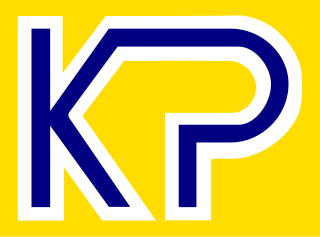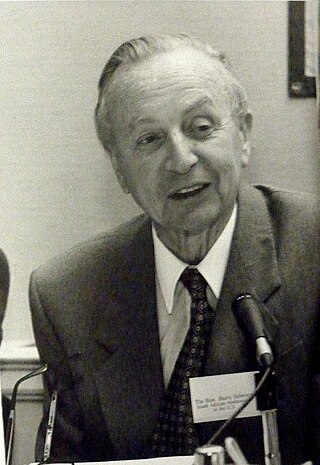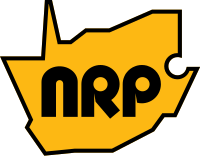
The Democratic Party (DP) was the name of the South African political party now called the Democratic Alliance. Although the Democratic Party name dates from 1989, the party existed under other labels throughout the apartheid years, when it was the Parliamentary opposition to the ruling National Party's policies.

The National Party, also known as the Nationalist Party, was a right-wing to far-right political party in South Africa founded in 1914 and disbanded in 1997, which was responsible for the implementation of apartheid rule. The party was an Afrikaner ethnic nationalist party, which initially promoted the interests of Afrikaners but later became a stalwart promoter and enactor of white supremacy, for which it is best known. It first became the governing party of the country in 1924. It merged with its rival, the SAP, during the Great Depression, and a splinter faction became the official opposition during World War II and returned to power. With the National Party governing South Africa from 4 June 1948 until 9 May 1994, the country for the bulk of this time was only a de jure or partial democracy, as from 1958 onwards non-white people were barred from voting. In 1990 it began to style itself as simply a South African civic nationalist party, and after the fall of apartheid in 1994, attempted to become a moderate conservative one. The party's reputation was damaged irreparably by perpetrating apartheid and it dissolved itself in 1997.

The United Party was a political party in South Africa. It was the country's ruling political party between 1934 and 1948.
The Progressive Party was a liberal party in South Africa which, during the era of apartheid, was considered the left wing of the all-white parliament. The party represented the legal opposition to apartheid within South Africa's white minority. It opposed the ruling National Party's racial policies, and championed the rule of law. For 13 years its only member of parliament was Helen Suzman. It was later renamed the Progressive Reform Party in 1975, and then Progressive Federal Party in 1977. The modern Democratic Alliance considers the party to be its earliest predecessor.

The Conservative Party of South Africa was a far-right South African political party that sought to preserve many aspects of apartheid in the system's final decade, and formed the official opposition in the white-only House of Assembly in the last seven years of minority rule. It declined quickly after apartheid ended, before being merged with the Freedom Front in 2004.

The Progressive Federal Party (PFP) was a South African political party formed in 1977 through merger of the Progressive and Reform parties, eventually changing its name to the Progressive Federal Party. For its duration was the main parliamentary opposition to apartheid, instead advocating power-sharing in South Africa through a federal constitution. From the 1977 election until 1987 it was the official opposition of the country.
Liberalism in South Africa has encompassed various traditions and parties.
The Senate was the upper house of the Parliament of South Africa between 1910 and its abolition from 1 January 1981, and between 1994 and 1997.

General elections were held in South Africa on 30 November 1977. The National Party, led by John Vorster won a landslide victory in the House of Assembly. The newly formed Progressive Federal Party, led by Colin Eglin became the official opposition. The New Republic Party, successor to the United Party, won only 10 seats, all but one of them in Natal Province. Once again, the Herstigte Nasionale Party failed to win any seats.

General elections were held in South Africa on 29 April 1981. The National Party, under the leadership of P. W. Botha since 1978, lost some support, but achieved another landslide victory, winning 131 of 165 directly elected seats in the House of Assembly.
General elections were held in South Africa on 6 May 1987. The State of Emergency cast a cloud over the elections, which were again won by the National Party (NP) under the leadership of P. W. Botha, although for the first time it faced serious opposition from the right of the South African political spectrum. The election resulted in the creation of the Second Botha Cabinet, which held power until 1989.

General elections were held in South Africa on 6 September 1989, the last under apartheid. Snap elections had been called early by the recently elected head of the National Party (NP), F. W. de Klerk, who was in the process of replacing P. W. Botha as the country's president, and his expected program of reform to include further retreat from the policy of apartheid. The creation of the Conservative Party had realigned the NP as a moderate party, now almost certain to initiate negotiations with the black opposition, with liberal opposition openly seeking a new constitutional settlement on liberal democratic and federalist principles.

The Tricameral Parliament, officially the Parliament of the Republic of South Africa, was the legislature of South Africa between 1984 and 1994, established by the South African Constitution of 1983, which gave a limited political voice to the country's Coloured and Indian population groups. The majority Black population group was however still excluded, their interests notionally represented in the governments of the black homelands, or "bantustans", of which they were formally citizens. As these institutions were largely politically impotent, its principal effect was to further entrench the political power of the White section of the South African population.

A referendum on a new constitution was held in South Africa on 2 November 1983 in which the white population was given the opportunity to approve or reject the Constitution of 1983. This constitution introduced the Tricameral Parliament, in which Coloured and Indian South Africans would be represented in separate parliamentary chambers, while black Africans, who were the majority of South Africa's population, would remain unrepresented. The referendum passed with 66.3% of voters voting "Yes"; consequently the new constitution came into force on 3 September 1984.
Wyatt Vause Raw, DMS was a conservative opposition South African politician of the Apartheid era. He was a prominent member of the United Party from the 1940s to the late 1970s, and the leader of the succeeding New Republic Party (NRP).

Harry Heinz Schwarz was a South African lawyer, statesman and long-time political opposition leader against apartheid in South Africa, who eventually served as the South African Ambassador to the United States during the country's transition to majority rule.
Although the Democratic Alliance of South Africa in its present form is fairly new, its roots can be traced far back in South African political history, through a complex sequence of splits and mergers.
The Transvaal Provincial Council was the provincial council of the Transvaal Province in South Africa. It was created by the South Africa Act 1909, from the formation of the Union of South Africa on 31 May 1910, and replaced the Transvaal Legislative Assembly which had been created through self-government in 1907. The first election to the provincial council took place on 15 September 1910.
The Natal Provincial Council was the provincial council of Natal Province in South Africa. It was created by the South Africa Act 1909, with effect from the formation of the Union of South Africa on 31 May 1910.
Graham Brian Douglas McIntosh is a South African farmer, businessman and retired politician. He was active in South African politics and served for four decades in the National Parliament in Cape Town from 1974 to 2014.













